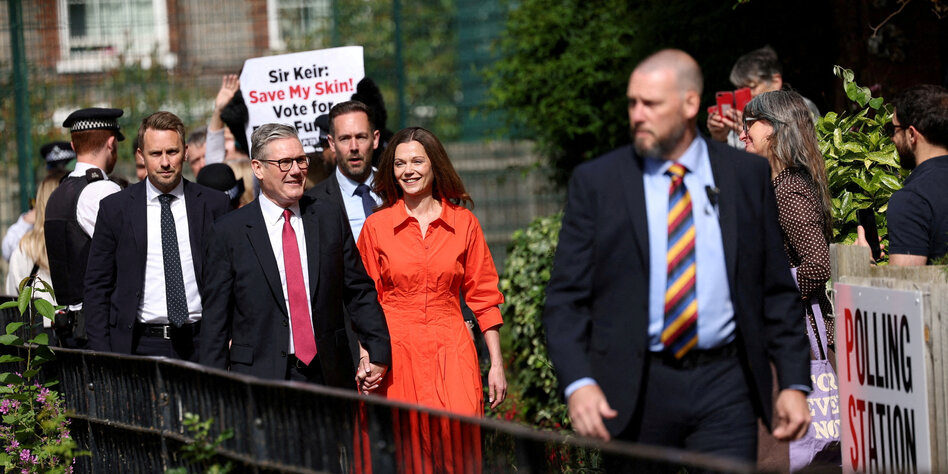According to early predictions, the opposition Labour Party has clearly won the general election in Great Britain, with 410 of the 650 seats in parliament.
Prime Minister-designate Keir Starmer and his wife to vote on Thursday Photo: Claudia Greco/rtr
LONDON taz/dpa/rtr/ap/ | The Labour Party has won the UK general election. The joint exit poll by Britain’s major TV networks gave the previous opposition party 410 of the 650 seats in the House of Commons – more than double the number at the last election in 2019. Labour leader Keir Starmer will become the next prime minister on Friday of the United Kingdom.
The former governing Conservatives will fall to 131 seats, just a third of their 2019 result. Early forecasts suggest numerous ministers have lost their direct mandates, but Prime Minister Rishi Sunak is expected to retain his parliamentary mandate.
The second big loser is the Scottish National Party (SNP), which has been dominant in Scotland to date and holds just 10 of Scotland’s 56 direct seats. This means that their claims to demand a new independence referendum on the basis of a good result in this election are likely to be dead.
Nigel Farage’s right-wing populist party Reform UK achieved a respectable victory with 13 seats, more than generally expected. Big gains are also attributed to the Liberal Democrats, who achieved their best result in 100 years with 61 seats.
Worst result in 200 years
For the Conservatives, however, this is likely to be their worst result in almost 200 years. The victorious Labour Party remains just short of Tony Blair’s record result at the 1997 change of government, when Labour replaced the Conservatives with 418 seats. Early vote share forecasts also show the party lagging behind most opinion polls in recent weeks, well below the 40 percent forecast.
Nevertheless, this election is a huge triumph for Labour and an even more devastating defeat for the Conservatives after fourteen years in power.
A A series of crises and scandals had hit the party that had been in power since 2010. In late May, Sunak – spurred on by good inflation figures – called for an election on July 4. Britons had until 11pm on Thursday to cast their votes.
The election was due to be held by January 2025 at the latest. However, the earlier election date did not change the fact that Labour continued to dominate the polls, even though party leader Starmer is not considered a great charismatic.
Countdown to Friday
All 650 seats in the lower house are awarded via direct mandate. The absolute majority in the House of Commons is 326 seats. At the last election in 2019, the Tories won 365 seats, Labour had 202 seats.
The constituencies will be counted until Friday morning. King Charles III will officially instruct the new prime minister to form a government on Friday.


